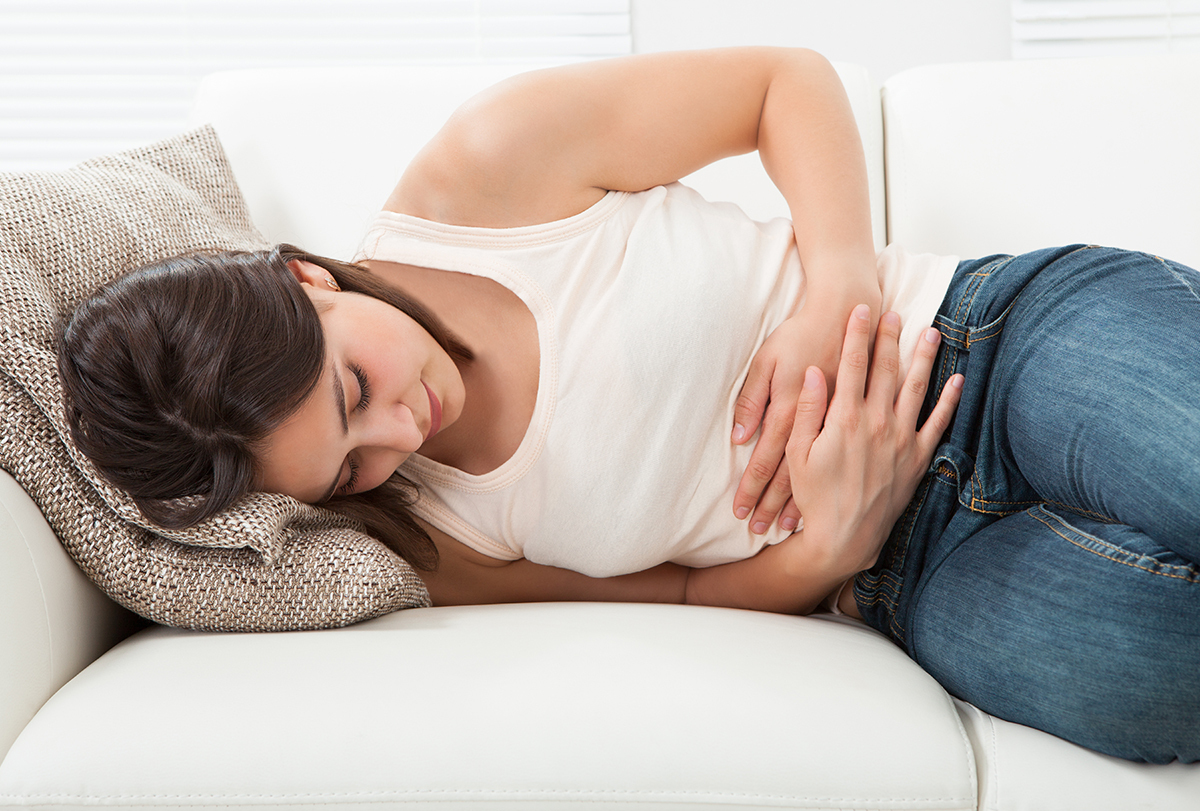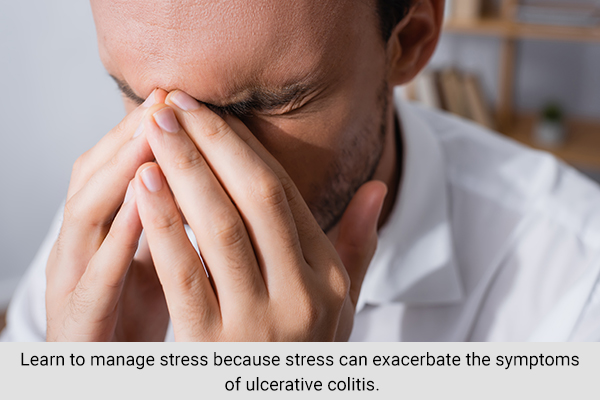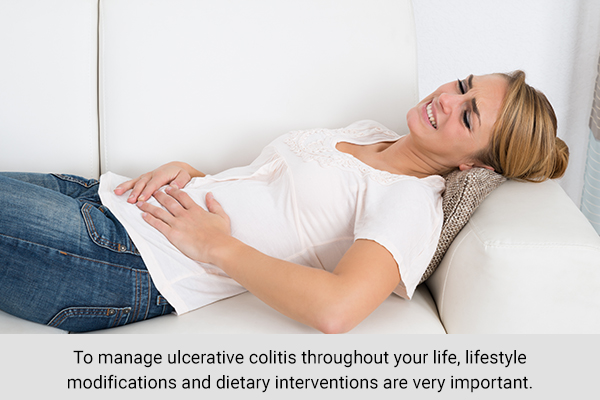In this article:
Ulcerative colitis is defined as inflammation in the bowel, colon, and rectum. It is an autoimmune disorder, which basically means that your body’s immune system starts to attack its own tissues, causing inflammatory responses in those areas.

What causes the body to do so is unknown and requires more research. Autoimmune disorders, however, may be caused by environmental and genetic factors. (1)(2)
Although ulcerative colitis can develop at any age, those who are in the age range of 15–30 years are more prone to it. Statistically speaking, 9–20 in 100,000 people are reported to suffer from the condition every year. (3)
Home Remedies to Manage Ulcerative Colitis
Here are the top remedies you can try if you suffer from ulcerative colitis.
1. Incorporate olive oil in your diet
Olive oil is a very good home remedy to treat ulcerative colitis. It contains monounsaturated fats that have anti-inflammatory properties. It also has immunomodulatory properties, which is why it can also protect you from ulcerative colitis.
Consuming 2–3 teaspoons of extra virgin olive oil daily is a good practice to get these benefits. (4)
2. Consume fish oil supplements
Fish oil contains omega-3 fatty acids and has anti-inflammatory properties; thus, it is helpful in providing symptomatic relief from ulcerative colitis.
Omega-3 fatty acids are polyunsaturated fatty acids that reduce inflammatory response and its symptoms. Researchers suggested that patients who suffer from a type of gastrointestinal issue tend to have an abnormal fatty acid profile.
Starting your day with a gram of fish oil supplements is helpful in remedying ulcerative colitis. (5)
3. Try psyllium seeds
Psyllium seeds, also known as ispaghula husk, are rich in soluble fibers. It forms bulk in the gut, which promotes gut mobility.
Consuming 2 teaspoons of husk powder or psyllium seeds mixed in 1 cup of warm water every day is great for providing relief from ulcerative colitis. Make sure to drink this mixture before it becomes too thick. This will improve your condition significantly.
It is also important that you hydrate yourself adequately and drink enough water if you are following this remedy to avoid constipation.
Moreover, consult a medical professional before taking psyllium seeds to check that you don’t have bowel obstruction, which can be associated with constipation. (6)

4. Consume fenugreek seeds
Fenugreek seeds, or methi seeds, are very helpful in providing relief from the symptoms of ulcerative colitis. This is because they form a protective coat along the gastrointestinal tract.
These seeds are also known to be anti-inflammatory agents and provide a good amount of nutrition in the forms of vitamin A, vitamin C, iron, calcium, and others.
Crushing 1 teaspoon of fenugreek seeds, adding it to a cup of hot water, steeping it to make fenugreek tea, and drinking it daily has been known to show improvement in such cases. (7)
5. Drink chamomile tea
Chamomile is very helpful in soothing the gastrointestinal tract. It also has anti-inflammatory properties.
Adding a few teaspoons of dried chamomile flowers to hot water to make chamomile tea and consuming it at least once a day helps in resolving ulcerative colitis symptoms. (8)
6. Increase your ginger intake
Studies have shown that ginger is very helpful in managing ulcerative colitis because of its anti-inflammatory properties. Not only this, but ginger is also a very good antioxidant agent, which is a great option for those who suffer from ulcerative colitis.
To consume ginger tea, all you have to do is grate ginger, add it to a cup of water, boil it, and drink the tea. If you do not like the flavor, you can add some honey and lemon juice to it as well. Doing this a few times a week is enough to see positive improvements.
If you do not want to drink ginger tea, you can also take ginger supplements after consulting your doctor. (9)

7. Try calendula herb
Calendula is a popular herb that is known for its anti-inflammatory properties and therefore is very good at managing symptoms associated with ulcerative colitis. Not only this, but it can also improve your digestion and promote healing of tissues.
To consume calendula, add calendula flowers to a cup of hot water, steep it for a few minutes, and then strain the liquid. Drink this tea at least twice a day for its benefits. (10)
Symptoms of Ulcerative Colitis
The symptoms associated with ulcerative colitis include:
- Abdominal discomfort
- Diarrhea
- Rectal bleeding
- Ulcers in the large intestine
- Soreness
- Pus production
The ICD-10 classification of diseases further shares some other symptoms and other important points. These include:
- The most commonly reported symptoms are abdominal pain and bloody diarrhea.
- Additional symptoms may include anemia, tiredness, weight loss, loss of appetite, rectal bleeding, skin sores, and joint pain.
- Children who suffer from ulcerative colitis may even face growth issues.
- Roughly about 50% of people who have ulcerative colitis report only mild symptoms. (11)
The symptoms of ulcerative colitis do not tend to stay for a longer duration of time; they come and go. However, some people may experience these symptoms on a daily basis.
Since the disease is caused by the body’s immune system attacking itself, the treatment or cure for it is yet to be found. The good news is that there are some remedies and natural ways of dealing with it and providing yourself with some symptomatic relief.
Dietary Interventions and Lifestyle Changes to Manage Ulcerative Colitis

Here are some diet and lifestyle changes that may help to manage your symptoms:
- Eat small meals instead of big meals, especially if you are planning to go on a trip where you may not have access to clean washrooms.
- Try to avoid food that causes your ulcerative colitis to flare up.
- Make sure that you do some form of exercise every day.
- Learn to manage stress because stress can exacerbate the symptoms of ulcerative colitis. (12)
- A few psychological interventions such as cognitive behavioral therapy (CBT) and mindfulness strategies may also be implemented.
- Remember to establish realistic objectives. Keep in mind that any stress, be it something minor or major, can be conquered.
- Attend self-help gatherings as these can also help a lot. These are groups of 6 or more patients suffering from ulcerative colitis who connect via social media groups or come together from time to time and talk to de-stress.
- Do not expect big miracles to occur in one day. Rather, desire to get a little better every passing day.
- Make healthy eating choices and keep track of food that you find to be problematic for you. Avoid foods that are hard to digest, and include fresh fruits and vegetables in your diet.
- Foods that have high fat content such as dairy and dairy products are known to worsen symptoms of ulcerative colitis and hence should be avoided.
- The above-mentioned home remedies are a good way to manage ulcerative colitis, but you have to make sure that you take a few dietary measures.
- Cut down on refined carbohydrates and also try to stay away from food allergens if you have any. Drinking plenty of water is absolutely important and taking probiotics is a great choice. Make sure that you follow a diet that is highly nutritious, and consult your doctor for vitamin supplementation, if needed, because ulcerative colitis can hinder the absorption of nutrients. (13)
Preventive Tips Against Ulcerative Colitis
The American College of Gastroenterology has made some guidelines on preventive care in patients with ulcerative colitis. The recommendations include:
- Screen for skin malignancies.
- Assess your bone-mineral density.
- Get a vaccination against herpes zoster virus, pneumococcus, H. influenzae, and the flu virus.
- Do not travel to regions where yellow fever is persistent without talking with an expert first.
- Get a screening for mental disorders such as depression or anxiety.
- Women who suffer from ulcerative colitis should get a cervical cancer screening every year. (14)
Most-Asked Questions About Ulcerative Colitis
Is ulcerative colitis permanent?

Ulcerative colitis is a chronic disease, which means it may last for a very long duration. There may be times when your symptoms might go away, but this does not mean that they will not come back.
To manage ulcerative colitis throughout your life, lifestyle modifications and dietary interventions are very important. (15)
What is the medical treatment for ulcerative colitis?
Medical treatment for ulcerative colitis includes: (16)
- Amino salicylates
- Corticosteroids
- Immunosuppressant
- Cyclosporin
- Biologics
- Surgeries such as colectomy and ileostomy
What puts you at risk for ulcerative colitis?
Risk factors for ulcerative colitis include: (17)
- Age
- Ethnicity
- Family history and genetics
- Diet such as excessive consumption of polyunsaturated fatty acids
- Sedentary lifestyle
- Smoking
- Environmental factors such as bacteria or chemicals that trigger inflammation in the gastrointestinal tract
Is aloe vera juice good for those who suffer from ulcerative colitis?
Aloe vera has been found to be helpful in ulcerative colitis due to its anti-inflammatory properties. Consuming aloe vera gel daily or drinking 2 tablespoons of aloe vera juice at least once a day has been known to show positive effects. (18)
Is wheatgrass juice a good ulcerative colitis remedy?
Wheatgrass juice has antioxidant properties, which is why it has been found to be helpful for those who suffer from ulcerative colitis. Wheatgrass juice not only helps in reducing abdominal pain, but it also helps in managing diarrhea and rectal bleeding, which are common symptoms of ulcerative colitis.
Drink wheatgrass juice every day for its benefits. (19)
What are some complications of untreated ulcerative colitis?

Ulcerative colitis that remains untreated can cause long-term effects and complications, which include: (20)
- Nutritional deficiencies
- Pelvic abscess
- Osteoporosis
- Bacterial/viral gastroenteritis
- Bowel perforation
- Increasing the risk of bowel cancer
What are some complications that may occur after surgery?
- Enterocutaneous fistulas – an abnormal connection that develops between the intestinal tract or stomach and the skin
- Pouch prolapse (pouchitis) – a rare but important complication to consider in patients with ulcerative colitis who have undergone surgery to create a pouch
- Incontinence
- Sexual dysfunction
- Toxic megacolon (21)
What are the diagnostic criteria for ulcerative colitis?
To diagnose ulcerative colitis, physicians examine medical records and family history, perform a physical exam, and request medical tests. These tests are ordered to:
- Verify the diagnosis of ulcerative colitis
- Check the severity of ulcerative colitis
- See how much of the large intestine is involved
- Strike off other health issues such as infections, irritable bowel syndrome, or Crohn’s disease because they tend to cause symptoms identical to those of ulcerative colitis
Medical and family history
To aid in the diagnosis of ulcerative colitis, your physician will ask about your symptoms, your medical history, your family’s medical history, and the drugs you have taken. Your doctor will also inquire about your lifestyle choices, such as smoking.
Physical exam
During a physical exam, your healthcare provider may:
- Check your BP, heart rate, and temperature as these vitals are required to analyze how severe your disease is, if you do suffer from ulcerative colitis.
- Use a stethoscope to hear sounds in your abdominal region.
- Press on your abdomen to check for tenderness.
- Give you a digital rectal exam to check for blood in your stool.
Blood tests
A healthcare professional will request a blood sample from you for analysis in a lab. Physicians use blood tests to look for indications of ulcerative colitis and related complications such as anemia. Blood tests can also detect signs of infection or different digestive disorders.
Stool tests
A healthcare professional will offer you a container for storing a sample of your stool and tell you where to send the container for examination. Physicians may utilize stool tests to look for conditions other than ulcerative colitis, such as infections that can be blamed for your symptoms.
Doctors may also employ stool tests to study the signs of inflammation in the intestines.
Endoscopy of the large intestine
- Doctors order an endoscopy of the large intestine with biopsies to confirm a diagnosis of ulcerative colitis and leave out other digestive disorders. Physicians also use endoscopy to discover how severe your ulcerative colitis is and how much of the large intestine is affected.
- During an endoscopy, physicians use an endoscope, which is a lengthy, adjustable, thin tube that has a tiny camera on one end to view the lining of your intestine. A pathologist will analyze the tissue sample taken by the doctor under a microscope.
Two types of endoscopy turned to for the diagnosis of ulcerative colitis are:
- Colonoscopy, in which a healthcare expert uses a type of endoscope known as a colonoscope to see the lining of your rectum and your entire colon
- Flexible sigmoidoscopy, in which a healthcare expert uses a type of endoscope called a sigmoidoscope to see the lining of your rectum and lower colon. (3)
Final Word
If you’re suffering from ulcerative colitis, you may be able to manage your symptoms by trying your hand at home remedies while following the doctor-recommended treatment. Lifestyle interventions such as dietary changes, and regular exercising is also helpful.
Another important thing is having the right kind of support from friends, family, and people who have gone through similar experiences. If managed correctly, ulcerative colitis can be controlled to not interfere with the quality of your life.
- Was this article helpful?
- YES, THANKS!NOT REALLY


